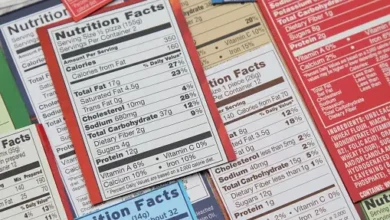A hungry young boy runs up to the kiosk in the early afternoon and holds out a pound for the vendor. His brown shirt is mottled with dirt and his hair a tangled mop that ends just before reaching his shoulders. He wants a bag of chili lemon-flavored potato chips, or “shibsy.”
For a street kiosk vendor in Cairo, this boy is a typical customer, as is his snack selection. But diets heavy in junk food, much of it bought from the small snack shops ubiquitous throughout the country, has nutritional experts concerned. They say that a lack of healthy eating education, the relative inexpensiveness of snack foods at kiosks and in schools, a lack of adequate parental guidance, cultural and societal norms, and the government’s inability to step in have all contributed to many children's unhealthy diets, which are likely to have negative effects on their long-term health.
The kiosks are easy to spot by the side of Cairo’s roads, boxed enclosures that always appear to be overflowing with sundry arrays of potato chips, cookies, candy bars, chocolates, soft drinks, juices and bottled water, all of which sport colorful labels and promises of delicious tastes to tempt their young targets. On school mornings, children in uniforms can be found crowding around these small stores, handing over valuable change for the coveted snacks.
According to Dr. Nagy Sobhy, a dietician at the Maadi Diet Clinic, parents “give the children money, and [the children] buy chips and burgers and sandwiches and sweets.”
Sobhy believes this hands-off approach is damaging to children’s health, as they are consuming food composed mainly of carbohydrates, sugar, butter and oil. This problem is further exacerbated by the liberal use of oil in the preparation of some of the most common street foods sold in Cairo, namely fuul, taamiya and shawarma.
Emad, who runs a small kiosk on a side street in theSayeda Zeinab neighborhood, says he sells what his customers want, which is often the type of food Sobhy describes as detrimental to health. His kiosk announces itself with a large Coca-Cola sign above its service window.
“Children want potato chips with their eggs or fuul in the morning,” he explains, saying that they often come to his kiosk to collect the snacks before school.
Emad does not explicitly admit to selling unhealthy food. When asked about it, he compares what he sells to the sugar-filled drinks that can be found at ahwas and coffee shops.
Up against a wall to the right of the kiosk, Emad has stacked maybe 50 boxes of different kinds of chips, left open to show the small, 50-piaster bags inside. He counts off all of the different types and sizes on his fingers, like a waiter at an expensive steakhouse detailing the night’s prime cuts. It is from this impressive chip-box tower that the young boy selects his preferred flavor.
While Emad stresses the individual’s right to choose what he or she eats, Lynda Aune, the CEO and a nutrition and lifestyle consultant of Choices Weight Loss Healthy Eating Center in Maadi, worries about what people are eating due to “a lack of information about nutrition.”
She writes in an email: “People do not really know what they are eating and are not aware of the potential problems with eating this type of food.”
The cheap price of junk food for both kiosk vendors and their young customers, she goes on, only helps to perpetuate this problem.
“I have observed many children at the kiosks with limited funds, so [they] are open to suggestions from the owner as to what they can buy for a set amount,” she writes. “Again there is a lack of other options and even if there are other options they will probably be expensive by comparison if they are healthy.”
Aune does not necessarily blame parents for their children’s unhealthy diets. “Some parents may [know about their children’s eating habits], but most do not know what is in this type of food,” she says.
At another kiosk in Sayeda Zeinab, this one on the corner of a popular souq next to the Saad Zaghloul metro station, vendor Eissa Awamy has a different take. A sturdy, confident-looking man wearing a galabeya, he says children in the neighborhood usually buy cookies and candy from him before going to school.
Awamy insists that the food he sells is just as healthy as the vegetables and fruits being sold on the other side of the intersection. He also says that what he sells is no cheaper than vegetables or fruits. To Awamy, sales break down according to a simple division of responsibilities. He provides the snacks, sweets, soft drinks and cigarettes, while other vendors provide other desired items.
Like vendor Emad, Awamy says cigarettes are his kiosk’s main draw. He adds, without explanation, that vegetables can’t be sold alongside cigarettes.
Sobhy, the dietician, sees few options to improve children's unhealthy diets.
“It’s difficult, it’s very difficult,” his voice trails as he considers possible solutions. He eventually recommends that parents “be somewhat restrained in giving their kids a lot of money” and that children be given better education on healthy eating. But he has little faith in government action, saying it would be too difficult for the state to play a significant role when it struggles at the simple task of providing meals in schools.
Aune believes this resistance to changing eating habits is endemic for Egyptians.
“This would take a massive amount of time, effort and funds,” she writes. “Remember this is a society that first thinks that lifestyle diseases are a normal part of aging which we know is not the case. … To make societal changes requires a belief by society that good health is beneficial and governments have to relate this good health to saving tax dollars.”
With the government currently in flux and the economy weak, significant changes are unlikely to take place anytime soon. In the meantime, Emad, Eissa and the other kiosk vendors will continue to supply the market with what it demands. Emad describes it simply: “Everyone has the right to choose.”




